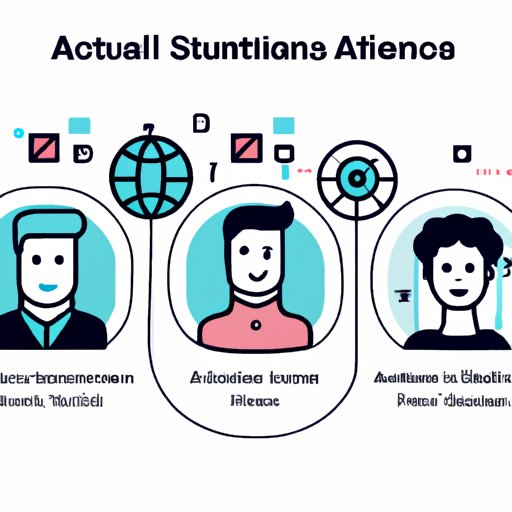Introduction
Artificial intelligence (AI) is a rapidly growing technology that has the potential to revolutionize many industries, including sales. AI-driven solutions are being used to improve sales performance, develop new sales strategies, collect customer insights, and automate sales processes. In this article, we will explore how AI is changing the sales industry and examine the impact it is having on businesses.
Examining the Impact of AI on Sales Performance
AI-driven solutions can be used to improve sales performance in numerous ways. For example, AI can be used to analyze customer data, identify trends and patterns, and suggest strategies for optimizing sales efforts. AI can also be used to monitor customer conversations and provide real-time feedback to sales representatives. Additionally, AI can be used to automate mundane tasks such as data entry, freeing up time for sales reps to focus on more important tasks.
There are numerous examples of companies successfully implementing AI-driven sales performance solutions. For instance, Amazon uses AI-driven algorithms to predict customer buying habits and offer personalized product recommendations. IBM Watson helps sales teams understand customer preferences and suggest the best products for each customer. And Salesforce Einstein provides real-time insights into customer behavior, enabling sales reps to better recognize opportunities and act on them quickly.
Exploring New Opportunities with AI-Driven Sales Strategies
AI can also be used to develop new sales strategies by identifying untapped markets and emerging trends. AI-driven solutions can analyze large amounts of data quickly and accurately, allowing businesses to uncover new opportunities they may have otherwise overlooked. AI can also be used to identify new customer segments, target specific demographics, and personalize marketing campaigns.
As an example, Walmart uses AI-driven algorithms to analyze customer data and identify potential new customers. They then use this information to create targeted marketing campaigns that are tailored to each customer segment. Similarly, Microsoft leverages AI to develop personalized product recommendations for its customers, helping them find the most relevant products and services.

Leveraging AI to Improve Customer Insights and Personalization
AI can also be used to collect customer insights and personalize customer experiences. AI-driven solutions can help businesses better understand customer preferences, allowing them to tailor their offerings to meet individual needs. AI can also be used to automate customer service tasks, providing customers with faster response times and more accurate answers.
For example, Starbucks has implemented an AI-powered chatbot that provides customers with personalized recommendations based on their past orders. Additionally, Sephora uses AI to provide customers with personalized product recommendations based on their skin type and beauty goals. These examples demonstrate how AI can be used to improve customer insights and personalization.

Automating Sales Processes with AI
AI can also be used to automate sales processes, reducing the amount of manual labor required. AI-driven solutions can be used to streamline lead generation, follow-up emails, and other repetitive tasks. This allows sales reps to focus their efforts on more important tasks, such as closing deals.
For instance, Outreach.io uses AI to automate follow-up emails and prioritize leads. Similarly, Salesforce uses AI to automate lead scoring and qualification, helping sales teams prioritize the most qualified leads. These examples show how AI can be used to automate sales processes and free up more time for sales reps.
Developing an AI-Powered Sales Force for the Future
Finally, AI can be used to develop an AI-powered sales force for the future. AI-driven solutions can be used to develop sales reps’ skills, helping them become more efficient and productive. Additionally, AI can be used to automate administrative tasks, such as managing calendars and scheduling meetings, freeing up even more time for sales reps to focus on selling.
For example, Salesforce has implemented AI-driven tools to help sales reps hone their skills and become more proficient at their jobs. Additionally, IBM Watson helps sales reps better understand customer data, allowing them to make more informed decisions. These examples demonstrate how AI can be used to develop an AI-powered sales force for the future.
Conclusion
In conclusion, AI is revolutionizing the sales industry, offering numerous advantages over traditional sales methods. AI-driven solutions can be used to improve sales performance, develop new sales strategies, collect customer insights, personalize customer experiences, and automate sales processes. Additionally, AI can be used to develop an AI-powered sales force for the future, helping sales reps become more efficient and productive.
For businesses looking to leverage the power of AI to improve their sales performance, there are numerous options available. From AI-driven analytics to automated sales processes, there are a variety of tools and strategies that can be used to optimize sales efforts. With the right implementation, businesses can unlock the true potential of AI and unlock new opportunities for growth.
(Note: Is this article not meeting your expectations? Do you have knowledge or insights to share? Unlock new opportunities and expand your reach by joining our authors team. Click Registration to join us and share your expertise with our readers.)
